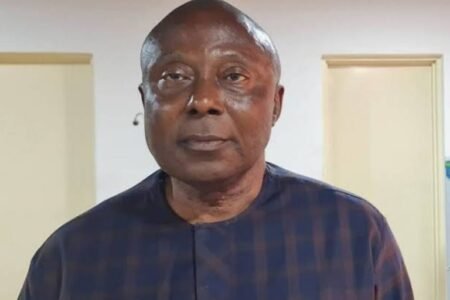The Governor Douye Diri-led Bayelsa State Government has approved the payment of N80,000 as a minimum wage for staff of local government councils after pressure from the Nigeria Labour Congress and Trade Union Congress.
The administration also stated that the differentials resulting from continuing discussions on the template used to pay the new minimum wage in November will be added to December payments.
Lawrence Ewhrudjakpo, the state’s acting governor, said this on Tuesday at the Government House in Yenagoa at a meeting with the state minimum wage implementation committee and chairmen of the eight local government councils.
Representatives from the NLC, TUC, Nigeria Union of Local Government Employees, Nigerian Union of Teachers, and Nigerian Medical and Health Workers Union attended the meeting, among others.
Ewhrudjakpo advised workers to create their own computations based on the consequential adjustment principle and share them with the state team so that the differentials can be paid alongside the December payments.
He stated that the decision to pay the new minimum salary to council workers was unanimously approved by all relevant stakeholders, including local government chairmen.
On the topic of the federal government circular for the rise in pensioners’ income, he stated that the government would look into it while also revealing that it had already approved a N10,000 raise for pensioners nationwide.
He added that due to financial constraints, the state government cannot use the federal government’s blueprint to execute the new minimum wage for workers.
He assured civil servants of government commitment to their welfare, adding Bayelsa was already paying a more competitive wage than most states in the South-South region in particular and the country as a whole.
He assured civil servants of government commitment to their welfare, adding Bayelsa was already paying a more competitive wage than most states in the South-South region in particular and the country as a whole.
He stated, “Firstly, we have agreed that the minimum wage for the local governments should also be N80,000. Now the difference is the consequential adjustment, which we think we cannot use the Federal Government’s consequential adjustment because the Federal Government’s rates are higher.
“Secondly, the federal government has ways and means, but both state and local governments do not have such powers. So, as we go for the consequential adjustment, we will look at what we can carry, and I need all of us to put the survival of Bayelsa State and our councils at the back of our minds as we negotiate.
“We should not fail to understand that the resources that come to the state or local government are not meant for those of us who are politicians and civil servants. The truth is that we constitute only about 15 per cent of those who earn income as salaries.
“The majority of our people earn social services such as health facilities, education, security, roads, bridges, and other amenities that are also being provided from those same resources. So, I really want to appeal to labour to show understanding.”
On behalf of organised labour, the state NLC chairman, Comrade Simon Barnabas, commended the government for approving the new minimum wage for state workers.
Barnabas, on the other hand, urged the government to use the federal government’s pattern for the consequential adjustment and to approve the N32,000 increment for pensioners outlined in a recent federal circular.










